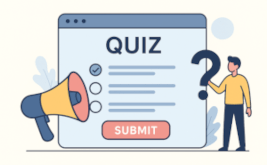This is an interactive guide that will help you understand how quizzes have become one of the most effective tools in marketing, education, and entertainment. Find out how they work and how they can help you achieve your goals.
1. What is a quiz?
A quiz is an interactive survey or test that engages the user in a dialogue to ultimately provide them with a valuable outcome: a personalized recommendation, a knowledge assessment, or just entertainment.
💬 Interactivity
🎁 Instant feedback
✨ Value for the user
Quiz formats
Entertainment
"What kind of character are you?" or "Erudition test". The goal is to engage and create a viral effect.
Educational
"Test your knowledge". The goal is to teach and assess knowledge in an interactive form.
Consulting
"Choose the perfect tariff". The goal is to help with the choice and lead to the purchase.
Selling
"Get a discount on your first order." The goal is direct sales or stimulation to purchase.
2. Why do we need quizzes?
Quizzes are a multi-functional tool. Click on any section of the diagram to learn about the key goals and benefits of using them.
Attracting and engaging your audience
Quizzes arouse curiosity and motivate the user to take action. They are the perfect way to turn a passive visitor into an active participant.
Advantages:
- Increase time on site
- Reduce bounce rate
- Increase brand loyalty
Data collection and audience segmentation
Through user responses, you unobtrusively collect information about their preferences, interests, and problems. This allows you to better understand your audience.
Advantages:
- Creating detailed audience portraits
- Possibility of personalizing offers
- Improving understanding of the target market
Lead generation (potential clients)
Quizzes can be a powerful tool for collecting contact information. People are willing to leave their email or phone number to get a quiz result, useful advice or a gift.
Advantages:
- Effective replenishment of the contact base
- Getting "warm" leads that are already interested in the topic
- High conversion to subscription or request
Education and training
In education, quizzes are used to reinforce material, test knowledge, and increase student engagement. They turn boring tests into an exciting game.
Advantages:
- Interactive consolidation of material
- Instant knowledge check
- Increasing student motivation
- Identifying gaps in knowledge
Help in choosing a product or service
Quizzes can work as a smart consultant. Instead of browsing through hundreds of products, the user answers a few questions and gets a personalized selection.
Advantages:
- Simplifying the selection process for the user
- Increasing conversion to purchase
- Reduced load on support service
Increase brand awareness and expertise
By creating useful and interesting quizzes, you demonstrate your expertise in the niche. Quizzes that people want to share help spread the word about your brand.
Advantages:
- Strengthening the brand's position as an opinion leader
- Increase organic traffic
- Improving reputation and trust
3. Where are quizzes used?
Quizzes are universal and find application in a wide variety of areas, helping to solve specific problems in each industry.
Marketing and Sales
Lead generation, audience segmentation, conversion increase and assistance in product selection.
Education
Knowledge testing, interactive learning, material reinforcement and student engagement.
Media and entertainment
Creating viral content, retaining audience on the site and increasing reach.
HR and Recruiting
Initial assessment of candidates, onboarding of new employees and corporate training.
4. Quizzes vs. Regular Forms
While quizzes and forms both collect information, they do so in different ways and are suited for different purposes. Here are the key differences.
| Characteristic | Quizzes | Common forms |
|---|---|---|
| Engagement | High, game format, interactivity. The user is interested in the result. | Low, perceived as routine, filled out as needed. |
| Goal for the user | Get something valuable (result, recommendation, discount), have fun. | Provide information (application, feedback, registration). |
| Data collection | Unobtrusive, through answers to questions, often about preferences and needs. | Direct, by specific fields (name, email, phone, message). |
| Conversion | Higher because users are motivated to get results. | Below, requires more motivation or necessity. |
| Format | Dynamic, step-by-step, often with branching logic. | Static, list of fields to fill in. |
| Application | Lead generation, segmentation, engagement, product selection, training. | Registration, contacts, orders, satisfaction surveys. |
5. How to create an effective quiz?
Creating a successful quiz is a process that requires planning. Here are the key steps to help you along the way.
Define the goal
Be clear about what you want to achieve with your quiz (e.g. generate leads, increase engagement).
Select a topic
The topic should be interesting and relevant to your target audience.
Think through the logic
Questions should be clear and answers should logically lead to certain results.
Create a design
The visual design should be attractive and consistent with your brand.
Suggest a result
The quiz result must be valuable and interesting for the user so that he wants to receive it.
Add a call to action
Prompt the user what to do next after receiving the result (e.g. subscribe, buy, learn more).
Quizzes are a powerful tool
When used correctly, quizzes can greatly improve your audience engagement and help you achieve your business goals. Experiment and create value for your users!


